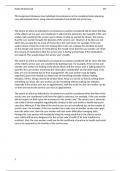Nadia Muhammad 1C M2
This assignment discusses how individual circumstances can be considered when planning
care will empower them, using relevant examples from health and social care.
The extent to which an individual’s circumstances could be considered will be when the likes
of the elderly service user are considered. It will promote autonomy; for example, if the care
worker had considered the service user's choice of what he wanted for dinner, this means
that the care worker thought the decision of the service user. However, if his likes are not
taken into account due to a lack of resources in the care home, for example, if the care
worker doesn’t have the crash cart stocked (the crash cart contains the schedule to check
on the dosage and amount of medications) this would mean that the care worker can’t limit
the amount of medications that the service user is having and perhaps if the medications
are expired. This would impact the service user’s health.
The extent to which an individual’s circumstances could be considered will be when the likes
of the elderly service user are considered by building trust. For example, if the service user
and the care worker are looking at the photo album and the service user is talking about his
past life, the care worker must keep the information confidential. On the other hand, if his
likes are not considered due to time management, the care worker must be highly
organised, given that nobody can keep track of everything mentally without making
mistakes. Hence, things need to be written down. Keep a to-do list so that by writing down
everything you must, the care worker can do everything without making any mistakes.
Especially if the service user has an appointment, with the to-do list, the care worker can be
on time and not let the service user miss an appointment.
The extent to which an individual’s circumstances could be considered when the likes of the
service user are considered it will have the right to advocacy, for example, if the care worker
did not respect or didn’t give fair treatment to the service user. The service user’s advocate
can make a formal complaint regarding the conduct of the care worker’s health and social
care duty. Whereas, if the likes of the service user are not considered due to the number of
service users, for example, if the care worker has to take care of another service user apart
from the older man, then the care worker will have some difficulties managing both.
Perhaps the care worker will mistakenly bring the wrong medicine to the elderly service
user, which will be very dangerous for the service user's health (if he took medicine by
accident). Also, the care worker could lose his/his certificate of practice for health and social
care or be reported by the families of the service user.
1




